He’s spent over 60 years of his life rearing livestock, lugging hay bales around and going beyond the call of duty to support his family, but Roger Nicholson, the flat cap wearing patriarch of Cannon Hall Farm, isn’t ready to be put out to pasture anytime soon.
When he unexpectedly took over the reins of the family business at just 16, he knew he’d be doing it ‘till the cows came home. But he’d probably have told you to pull the udder one if you’d have said he and his family would become television favourites six decades later.
If you’ve visited the farm, watched their lockdown livestreams on social media, or tuned in to Channel 5’s On the Farm programmes, you’ll appreciate the dedication the Nicholsons have to their craft. Farming isn’t a nine-to-five job and the team are up with the lark every morning 365 days a year.
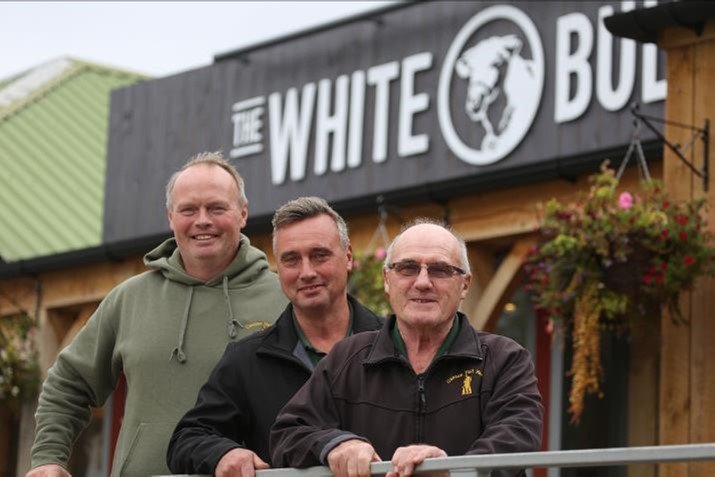
But the Nicholson family come from strong stock, with true Yorkshire pride, grit and determination entwined within every essence of their DNA. Qualities that have since been passed down to Roger’s own sons, Richard, Robert and David. When the horizon looks bleak and the landscape barren, the Nicholsons continue to plough on through with hope of a better tomorrow.
And through sheer fortitude and graft, the family have spent the last 30 years cultivating one of the UK’s finest visitor attractions.
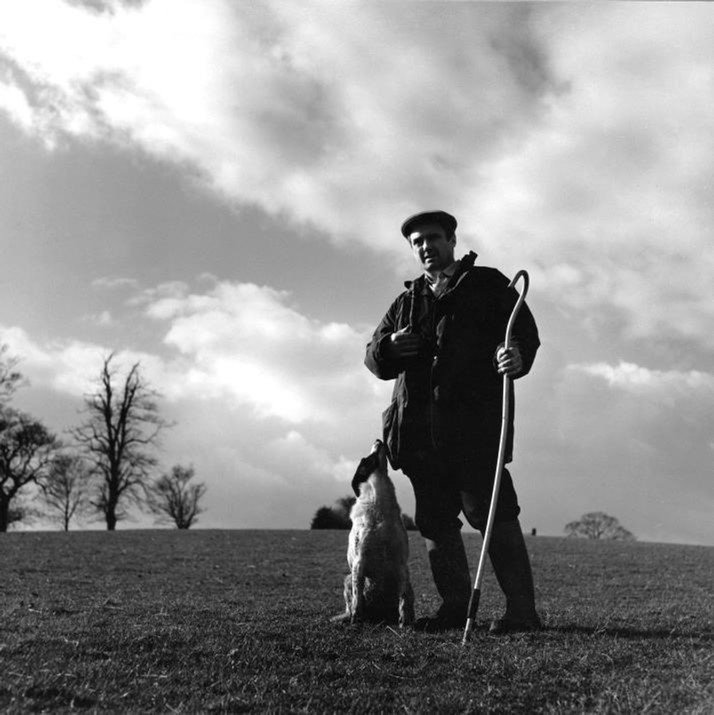
As we say in Yorkshire, ‘where there’s muck there’s brass’ and opening the gates to the paying public has proved prosperous. This daring move turned the family’s fortunes around and the family have since reaped the rewards of their labour with multi-million-pound redevelopments, awards in abundance, and becoming stars of the small screen.
But in spite of its success, the farm has never lost its heart and soul and pays homage to its roots throughout. The old beams the Nicholson kids used to tie Tarzan swing ropes on now prop up the farm shop. The new restaurants and eateries are named after the family’s beloved pets from years gone by. And Roger, his children and grandchildren play their respective parts in keeping the business afloat.
Leading the herd to new pastures
The idea to turn Cannon Hall Farm into a visitor attraction was Roger’s who, due to poor market values and substantial financial losses, had reached a fork in the road. ‘Just’ farming wasn’t working. It was time to either sell up and cut his losses or sow his seeds in other avenues.
Roger didn’t want the dream to end. Farming was all he’d ever known and he wasn’t about to end his family’s 300 year farming history at the drop of his flat cap. Elders before him had made sacrifices and now it was his time to take the bull by the horns.
His father, Charlie, had bought the site at Cawthorne in the late ‘50s after being forced out of their previous farm at Bank End in Worsbrough. The farm had belonged to the Nicholson family since 1650 but the council sought a compulsory purchase order to make way for a new housing development.
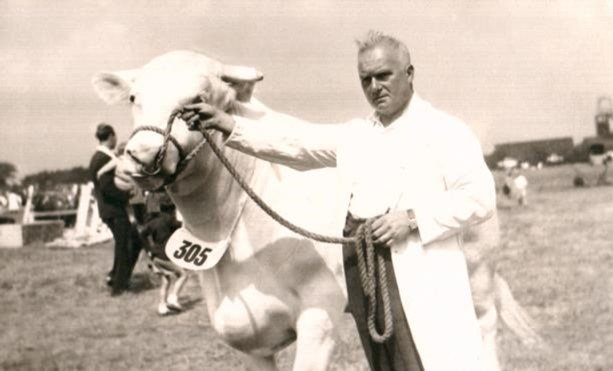
They were set to lose their home, land and livelihood to the tune of £60 an acre. But Charlie was never one to be defeated and saw this as a new challenge. He took his life savings to auction – with a limit of £7,000 – and came away the new owner of the 126-acre farm at the foot of the Pennine hills, having bid £100 over his budget to secure the family’s new home at the sound of the gavel.
Roger takes the reins
The new farm had great potential with lots of space to grow. But sadly, Charlie never lived to see his punt pay off. He died suddenly within 12 months of the family moving in and Roger, being the only son, had to step up as head of the family and business.
Roger was still at school and had such big boots to fill. But he was born to do it. His future had already been laid while he was still in the womb.
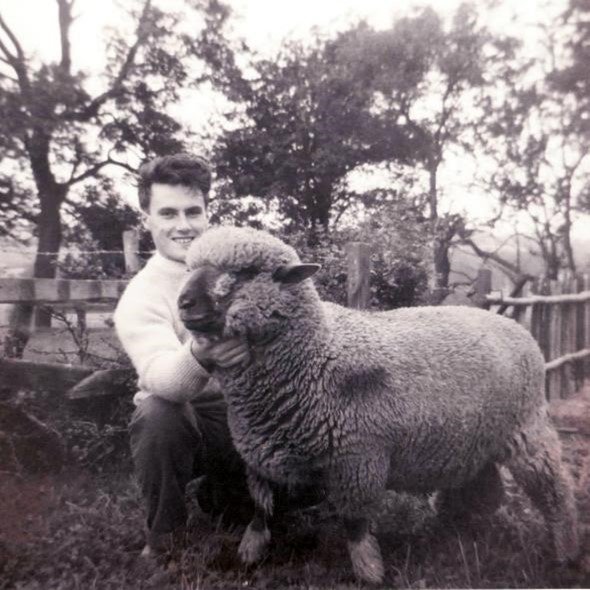
Charlie and his wife Irenie had three daughters and lost their first son in infancy, so they longed for another boy to secure their future. As a toddler, Roger would bottle feed the lambs and by eight-years-old was milking cows by hand after school. Even today aged 77, the smell of fresh milk still transports him back to those simpler times.
While his schoolmates could leave their education firmly in the classroom, Roger was learning the complicated business of farming – not just shearing sheep and rearing calves but the ins and outs of stock and trade.
But his father’s mentoring paid off. Two years after taking over the business, Roger had ensured it was self-sustaining and had a viable future. However, by the 1980s things had begun to wither. Despite their work ethic, the industry was hit hard and Cannon Hall Farm was losing money every year. In 30 years the most profit they had ever made was £700.
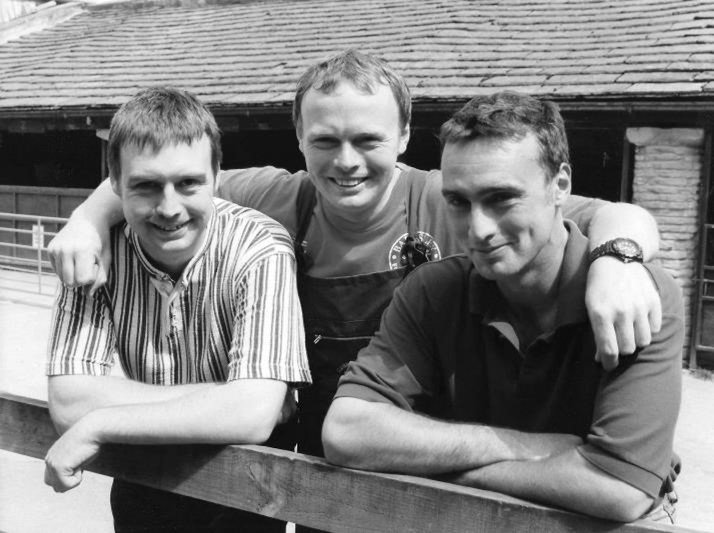
Roger now had three teenage sons’ stomachs to fill and his wife Cynthia to support. She had also come from an agricultural background, her family having a poultry farm in Halifax, and the pair met at a Young Farmers’ dance.
The three boys came within four years and Roger was hopeful at least one of them would carry on the Nicholson legacy. But even that didn’t look possible unless a miracle happened.
Ploughing on
Roger’s vision was to sell off some land and buildings and redevelop the site to allow visitors. However, the bank refused to lend Roger any more money and bluntly said he’d never been able to support his family so he should quit while he still had equity in the business.
But Roger had inherited his father’s pride and stubbornness. You will do well to try and change a Nicholson’s mind.
He finally found a bank that shared his prophecy and Cannon Hall Farm opened to the public on Good Friday 1989. Balancing the till at the close of that first day, they’d taken £100 and have never looked back since. Tourism was their future.
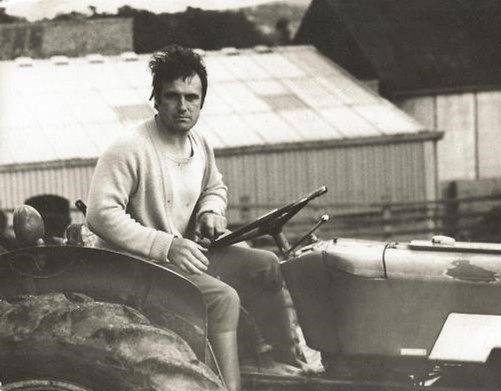
That’s not to say those early years were plain sailing. Money was tight but Roger was fearless, transporting the business through many stormy waters.
“Dad set a great example to us lads. He is the driving force behind Cannon Hall Farm’s success. He was, and still is, very stoic and if he hadn’t kept going we wouldn’t be where we are today. We’d like him to slow down a bit now but he won’t have any of it,” says eldest son, Richard.
Thirty years of hard graft
Over the last 30 years there has been considerable and continued reinvestment into the site to make it Yorkshire’s best large visitor attraction. The ramshackle old farm buildings are long gone, replaced with large purpose-built barns each with their own elevated viewing platform so visitors can see life on the farm first-hand, such as the new litter of piglets born each week.
The early days also saw Cynthia open a small tearoom where she would sell homemade scones. Again, demand quickly outgrew capacity and they built a larger café which recently was transformed for a second time into the White Bull restaurant, named after Grandad Charlie’s prize-winning, stout drinking white shorthorn bull, Sam, from the 1950s.
A farm shop and adventure playground were also added to improve the visitor offer, as was the iconic roundhouse and indoor soft play area. Visitors can ride tractors, bet on sheep or ferret races, and watch demos with the many farmers.
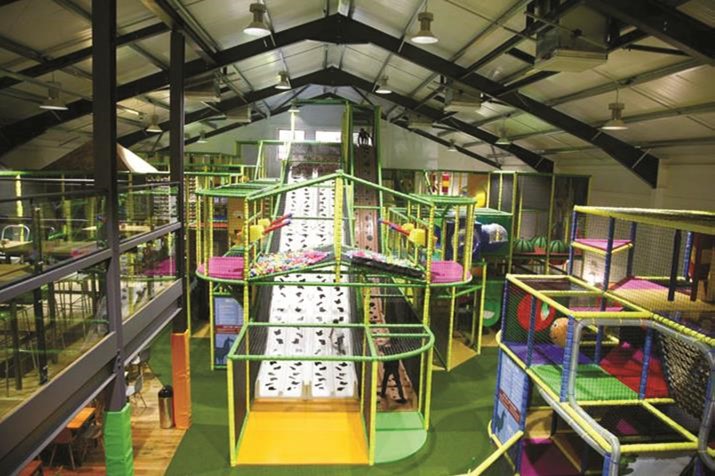
The site may look somewhat different from its initial launch but the job hasn’t changed much in the last three decades. Farmer Roger is still involved in every aspect of the business, joined at the helm by his three adult sons.
Before the new farm opened, the boys had all gone off to college, with Robert and David studying agriculture respectively at Askham Bryan and Bishop Burton colleges, while Richard followed his own dreams to study graphic design and photography.
“Our parents thought the outlook for the farm wasn’t great back then, so we were all encouraged to get an education and not rely on the business still being there when we returned. But luckily, the farm’s fortunes changed and we all left college at a similar time so everything fell into place,” Richard says.
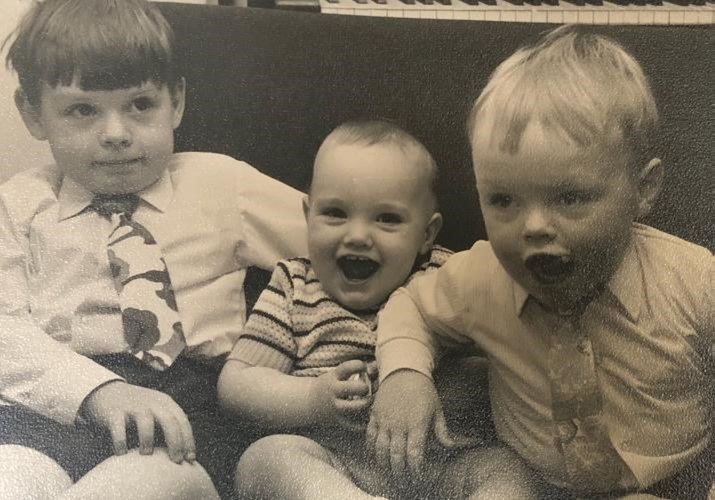
The days of plucking turkeys for Christmas and transporting them across the farm in their mother’s beloved but battered Silver Cross pram are but just memories. But the brothers are still firmly in the flock of 250 staff tasked with caring for both animals and paying visitors, mucking in just as they had done as kids to help the farm flourish.
“Robert and David are primarily farmers at heart, while I’m in the office tasked with marketing the business but we still all lend a hand where needed across the site – whether that’s serving in the farm shop, scooping ice cream or cleaning toilets,” Richard says.
The future of farming
With over 1,000 animals to care for, the working farm is still a full-time effort with animal welfare their most paramount priority.
“When you’re farming in front of the public, you’re under constant scrutiny and they’ll certainly remind you if you take your eye off the ball. But people love that they can see what life really is like for modern-day farmers, watching everything from births to milking and shearing.
“Everything is real and raw. Yes, we have livestock but the reality is that farming also comes with deadstock so there will be sadness and loss at times,” Robert says.
But there is no doubt the animals live a life of luxury down at Cannon Hall Farm – just ask reindeers Jeffrey and Prince who are enjoying retirement there – and all are in the best possible hands should anything happen.

When a ewe stood on and broke her newborn’s leg shortly after birth, David and Robert stepped in to put the tiny lamb’s rear leg in a plaster cast to give it a chance to live. Similarly, when they found twin lambs orphaned after their mother passed away, the race was on to get them to take a bottle five or six times a day to ensure they survived.
As experts in their field, the farmers at Cannon Hall Farm deliver various breeding programmes throughout the year. Earlier this year they went on a 15-hour round trip to Scotland to collect Grizzly Bear, a male Swiss Valais blacknose sheep (think Shaun the Sheep) to begin reproducing this rare breed.
They also recently recommenced the breeding of shire horses following tragedy two years ago which saw the loss of Poppy and her foal Chester. As a child, Roger learned to drive shire horses and so was keen to reintroduce these magnificent animals back into the farm’s fold. This March, they successfully delivered a baby foal to its mum Orchid and named him Will after Will Roe who helped Roger substantially following his father’s death.
A celebrity coop
Another of the newer additions to the farm is the herd of pedigree Highland cows which arrived last year. Dougal was born to Emma in early spring, followed shortly after by Bonnie, the second calf for mum Fern who won a first-place rosette at last year’s Great Yorkshire Show.
Bonnie’s brother, Ted, also had his taste of fame when Robert and David entered him into this year’s virtual show owing to Covid-19 cancelling all live events. He received star treatment from the brothers who took a few styling tips from David’s hairdresser wife to make sure he was groomed to perfection before his debut.
There are quite a few superstars down on the farm – and not just Barnsley’s band of broadcasting brothers – with Shakira the hip-shaking alpaca and Shetlands Ozzie Horseborne, Pony Hadley and his father Jon Bon Pony.
Jon Bon is quite the stud, having impregnated five mares in one weekend. But when he was feeling a little horse and not his usual sparkly self earlier this summer, Robert and David called in the vet for advice.
“He’d turned into a right pipe and slippers man and was losing weight so we knew something was wrong. Turns out he was feeling so long in the mouth because he’d got a bit of toothache which was stopping him eating. The vet brought high-tech equipment in to file his sharp teeth and he’s been right as rein ever since,” Robert says.

Along with the typical farmyard animals, Cannon Hall Farm is also home to some more exotic creatures which have adapted to the Barnsley climate. There are meerkats and porcupines, and the reptile house built in 2018 houses all sorts of creatures great and small.
“We’ve always kept llamas but we had to decide whether to put in for a zoo license for the other exotics. There was also great investment involved as we’d need generators on site in case of power cuts to ensure the tanks’ lights and heaters wouldn’t shut off. They cost us £80,000 but they were a blessing in disguise as the electric is always tripping out in Cawthorne so it means we’re never without a power supply,” Richard says.
But a power cut has been the last of their worries this year.
The coronavirus pandemic means Cannon Hall Farm was forced to close its doors for only the second time in 30 years, the previous being in 2001 during the foot and mouth outbreak.
For somewhere that relies heavily on visitors, particularly in the springtime when new life brings increased interest, the lockdown period was a difficult time for all and one that was hard to adjust to.
But they couldn’t just stay cooped up, brooding over the bad situation. The show had to go on. Animals can’t be furloughed – there was work to be done.
Lockdown recognition
The team ramped up their social media presence, sharing lockdown livestream with their hundreds of thousands of followers across the world for 132 consecutive days. From lambing during lockdown to how to trim a cow’s feet or why horses need protecting from the sun, their live videos showed the real and raw aspects of farming in an honest and heart-warming way.
They even received recognition from the Prime Minister, winning a Commonwealth Points of Light Award for lifting the nation’s spirits, and also won The Telegraph’s Lockdown Lift Award following 10,000 votes.
“The livestreams really gave Robert and David a purpose and helped their mental health through those strange times. There were so many baby animals being born that we thought it was a pity not to share those amazing moments with people at home. It also helped raise our profile at a time when it would have been so easy to disappear and we’ve now got a worldwide following with fans in Australia and America,” Richard says.
Stars of the small screen
Along with 7.30am daily broadcasts from the farm, the team were also going out to the nation every Tuesday night for eight weeks as part of Channel 5’s This Week on the Farm. A spin off from the popular Springtime on the Farm, for which Cannon Hall has been the host farm for three series, the weekly summer show let viewers have a gander at farm life during lockdown.
Due to restrictions, most of the filming was done by the Cannon Hall team on their phones or by Farmer Dale who is a hobby videographer, with outstanding results.
“He’s good with a shovel but even better with a camera,” Robert laughs.
The show predominantly featured Robert and David’s escapades with viewers falling for their broad Barnsley quips, brotherly banter and country charm.
The weekly episodes saw David wrestle with a 100kg ram named Arnie to shear him of his winter wool, the brothers called out to rescue a deer from the M1, and Robert’s pure excitement to see newborn calves charging about on grassy pasture for the first time.

Robert and David also took a trip down memory lane, reminiscing and recreating those childhood memories of growing up in the ’60s and ’70s when the farmyard and neighbouring country park was their playground.
The boys are long out of handmade shorts and ankle socks, their knees no longer grubby from those glorious innocent days, but they showed they still had a knack for exploring the countryside, going fishing, camping under the stars and building dens and tunnels.
Plus, they are brothers just two year apart after all, so the competitiveness has never really left them, either.

When once Robert would have coaxed his younger brother David into his get-rich-quick schemes such as asking visitors to the nearby museum to stroke baby chicks for a penny, he’s now betting his baby brother he can’t beat last year’s sheep shearing time – and saving money, too.
“Once upon a time, the wool cheque would pay the bills for months. But now it costs more to get a contractor in so we have cheap labour with Dave doing it instead,” Robert says.
Both of the On the Farm programmes have truly made for wholesome television, the unscripted and relaxed style of filming a breath of fresh air and hopefully a follow-up will be in the pipeline.

But in the meantime it’s back to business as usual – well, almost – now the lockdown restrictions have been eased. But I’m sure that as they discover the new way of working, the Nicholsons will do as they’ve always done and take everything in their stride.
Please note: due to Covid-19 restrictions, some of the farm activities stated here are not currently available. Please check website for details.






